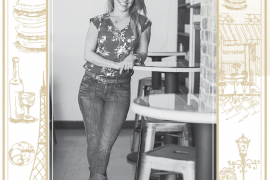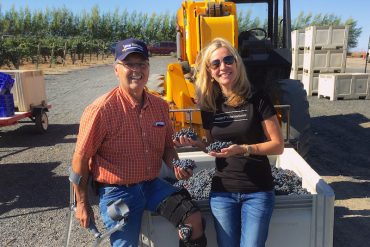written by Corinne Whiting | photography by Morgen Schuler
A few years ago, Jenna Newbrey was visiting family in Chelan when she witnessed “truckload after truckload of perfectly good apples” going to waste as they traveled to what she called the “apple graveyard.” A huge strike at the port meant no fruit was getting exported—causing the price of the bins to drop exponentially and the perfectly usable products to get tossed by the wayside.
After speaking with hardworking farmers in Washington’s Skagit and Whatcom counties, Newbrey learned this was a widespread problem—40 percent of crops were going to waste. The registered dietitian—with an MBA in sustainability, food and agriculture—quickly decided it was time to take charge and do something about it. She seemed perfect for the task, too, thanks to her expertise in building out sustainable food supply chains for health care systems, and her experience in helping regional producers gain access to lucrative institutional markets.
Newbrey points to two issues—first, there’s the challenge of sheer food waste that ranges from 40 percent of a farm’s total harvest being discarded to the excess that’s seen at grocery stores. While some items get tossed because they’re the wrong size or shape, other factors like export issues come into play, too. Then, there’s the side that Newbrey feels most passionate about—economic troubles affecting already-struggling farmers. “The fact that they’re not able to monetize half their harvest is really sad,” she said.
I absolutely love being able to know I am actually working with our growers to create viable, thriving businesses.
So what was her solution? Getting her hands on these passed-over goods and putting them to great (and tasty) use. Though Audley’s business model has recently shifted away from smoothies, the company’s main aim remains—creating healthy products chock full of flavor, the highest-quality nutrients and, according to its website, “a whole lot of love for audley [oddly] shaped fruits and veggies.” These days, the company is focusing on soups and is in the final stages of developing a cauliflower curry and tomato bisque creation, soon to roll out for a large client.
“We pivoted away from ready-to-drink consumer-focused products,” Newbrey explained, “after realizing we could have a much bigger impact reformulating current institutional products with higher quality ingredients at a lower price point.”
Audley now sells to large distributors and is in the midst of collaborating with a high-end chain of sandwich shops.
When it came to naming the startup, Newbrey was having a terrible time until she finally combined both of her kids’ names (Audrey and Brinkley) to form “Audley.” “[The name] accurately represents what we do—embracing the weird in produce and turning it into something delicious.”
The company works with farmers all over the region, dependent upon which ingredients are needed. “This region is unique in that we have a farmer-owned aggregation and distribution center (co-op) where our growers can drop our product and get paid for aggregating and distributing to our co-packer,” Newbrey explained. “We work with an incredible family-owned co-packer in Lynwood to develop recipes and get delicious products to market.”
At the beginning, Newbrey experienced struggles felt by most entrepreneurs—a lack of money and time. Newbrey continually returned to the question: “What are the pieces I’m really good at and most passionate about?” The turning point came, Newbrey said, once she began tapping into pre-existing partnerships, asking others for help and learning from the farmers themselves. “I’ve been leaning heavily on the network I’ve culled,” she said.
Newbrey admits this business has required tons of hard work on the back end. “But it’s completely worth it if I can help someone turn their business around,” she said. “I absolutely love being able to know I am actually working with our growers to create viable, thriving businesses.” And not to mention—creating delectable things along the way.







